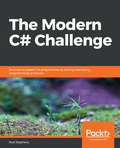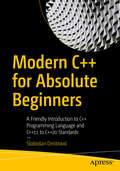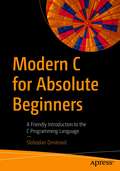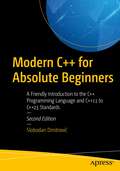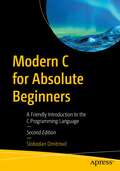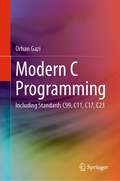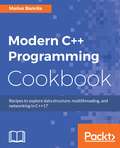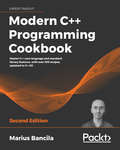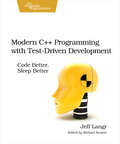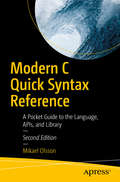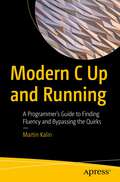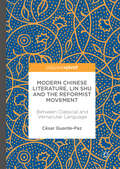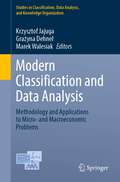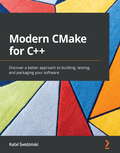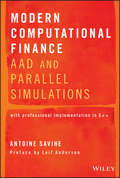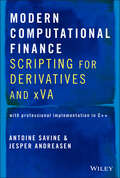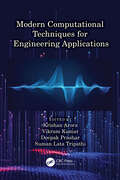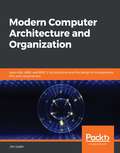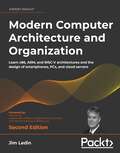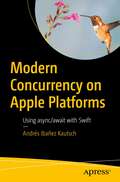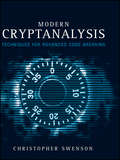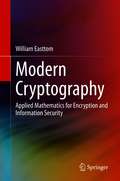- Table View
- List View
The Modern C# Challenge: Become an expert C# programmer by solving interesting programming problems
by Rod StephensLearn advanced C# concepts and techniques such as building caches, cryptography, and parallel programming by solving interesting programming challengesKey FeaturesGain useful insights on advanced C# programming topics and APIsUse locking and cached values to solve parallel problemsTake advantage of .NET's cryptographic tools to encrypt and decrypt stringsBook DescriptionC# is a multi-paradigm programming language. The Modern C# Challenge covers with aspects of the .NET Framework such as the Task Parallel Library (TPL) and CryptoAPI. It also encourages you to explore important programming trade-offs such as time versus space or simplicity. There may be many ways to solve a problem and there is often no single right way, but some solutions are definitely better than others. This book has combined these solutions to help you solve real-world problems with C#.In addition to describing programming trade-offs, The Modern C# Challenge will help you build a useful toolkit of techniques such as value caching, statistical analysis, and geometric algorithms.By the end of this book, you will have walked through challenges in C# and explored the .NET Framework in order to develop program logic for real-world applications.What you will learnPerform statistical calculations such as finding the standard deviationFind combinations and permutationsSearch directories for files matching patterns using LINQ and PLINQFind areas of polygons using geometric operationsRandomize arrays and lists with extension methodsExplore the filesystem to find duplicate filesSimulate complex systems and implement equality in a classUse cryptographic techniques to encrypt and decrypt strings and filesWho this book is forThe Modern C# Challenge is for all C# developers of different abilities wanting to solve real-world problems. There are problems for everyone at any level of expertise in C#
Modern C++ for Absolute Beginners: A Friendly Introduction to C++ Programming Language and C++11 to C++20 Standards
by Slobodan DmitrovićLearn the C++ programming language in a structured, straightforward, and friendly manner. This book teaches the basics of the modern C++ programming language, C++ Standard Library, and modern C++ standards. No previous programming experience is required. C++ is a language like no other, surprising in its complexity, yet wonderfully sleek and elegant in so many ways. It is also a language that cannot be learned by guessing, one that is easy to get wrong and challenging to get right. To overcome this, each section is filled with real-world examples that gradually increase in complexity. Modern C++ for Absolute Beginners teaches more than just programming in C++20. It provides a solid C++ foundation to build upon. The author takes you through the C++ programming language, the Standard Library, and the C++11 to C++20 standard basics. Each chapter is accompanied by the right amount of theory and plenty of source code examples. You will work with C++20 features and standards, yet you will also compare and take a look into previous versions of C++. You will do so with plenty of relevant source code examples. What You Will LearnWork with the basics of C++: types, operators, variables, constants, expressions, references, functions, classes, I/O, smart pointers, polymorphism, and more Set up the Visual Studio environment on Windows and GCC on Linux, where you can write your own codeDeclare and define functions, classes, and objects, and organize code into namespacesDiscover object-oriented programming: classes and objects, encapsulation, inheritance, polymorphism, and more using the most advanced C++ featuresEmploy best practices in organizing source code and controlling program workflowGet familiar with C++ language dos and donts, and moreMaster the basics of lambdas, inheritance, polymorphism, smart pointers, templates, modules, contracts, concepts, and more Who This Book Is For Beginner or novice programmers who wish to learn C++ programming. No prior programming experience is required.
Modern C for Absolute Beginners: A Friendly Introduction to the C Programming Language
by Slobodan DmitrovićLearn the C programming language easily and in a straightforward way. This book teaches the basics of C, the C Standard Library, and modern C standards. No previous programming experience is required.C is a language that is as popular today as it was decades ago. C covers a wide variety of domains. It can be used to program a microcontroller, or to develop an entire operating system. This book is an effort to introduce the reader to the C programming language in a concise and easy to follow manner.The author takes you through the C programming language, the Standard Library, and the C standards basics. Each chapter is the right balance of theory and code examples. After reading and using this book, you'll have the essentials to start programming in modern C. What You Will LearnThe C programming language fundamentalsThe C Standard Library fundamentalsNew C Standards featuresThe basics of types, operators, statements, arrays, functions, and structsThe basics of pointers, memory allocation, and memory manipulationTake advantage of best practices in C Who This Book Is For Beginner or novice programmers who wish to learn the C programming language. No prior programming experience is required.
Modern C++ for Absolute Beginners: A Friendly Introduction to the C++ Programming Language and C++11 to C++23 Standards
by Slobodan DmitrovićLearn the C++ programming language in a structured, straightforward, and friendly manner. This book teaches the basics of the modern C++ programming language, the C++ Standard Library, and modern C++ standards, including C++23. No previous programming experience is required. C++ is a language like no other, surprising in its complexity, yet wonderfully sleek and elegant in so many ways. It is also a language that cannot be learned by guessing, one that is easy to get wrong and challenging to get right. To overcome this, each section is filled with real-world examples that gradually increase in complexity. Modern C++ for Absolute Beginners, Second Edition teaches more than just programming in C++23. It provides a solid C++ foundation to build upon. The author takes you through the C++ programming language, the Standard Library, and C++11 to C++23 standard basics. Each chapter is accompanied by the right amount of theory and plenty of source code examples. You will work with C++23 features and standards, yet you will also compare and take a look into previous versions of C++. After reading this book, you'll be able to start programming in modern C++ standards. You will do so with plenty of relevant source code examples, freely available via a dedicated GitHub repository. What You Will LearnGet Introduced to modern C++ in a friendly but effective wayWork with the basics of C++: types, operators, variables, constants, expressions, references, functions, classes, I/O, smart pointers, polymorphism, and moreSet up the Visual Studio environment on Windows and GCC on Linux, where you can write your own codeDeclare and define functions, classes, and objects, and organize code into namespacesDiscover object-oriented programming: classes and objects, encapsulation, inheritance, polymorphism, and more using the most advanced C++ featuresEmploy best practices in organizing source code and controlling program workflowGet familiar with C++ language do's and don'ts, and moreManage the basics of lambdas, inheritance, polymorphism, smart pointers, templates, modules, contracts, concepts, and moreWho This Book Is For Beginner or novice programmers who wish to learn C++ programming. No prior programming experience is required.
Modern C for Absolute Beginners: A Friendly Introduction to the C Programming Language
by Slobodan DmitrovićLearn the basics of C, the C standard library, and modern C standards. Complete with modern, up-to-date examples and screenshots, this new edition is fully updated and reworked with the latest C23 standards and features. C is a language that is as popular today as it was decades ago. It can be used to program a microcontroller or to develop an entire operating system. Author Slobodan Dmitrović takes you on a journey through the C programming language, the standard library, and the C standards basics. Each chapter is the right balance of theory and code examples. Written in a concise and easy-to-follow manner, this book will provide you all the essentials needed to start programming in modern C. What You Will LearnUnderstand C programming language and C standard library fundamentalsWork with new C standards featuresStudy the basics of types, operators, statements, arrays, functions, and structsReview the fundamentals of pointers, memory allocation, and memory manipulationTake advantage of best practices in CWho This Book Is For Beginner or novice programmers who wish to learn the C programming language. No prior programming experience is required.
Modern C Programming: Including Standards C99, C11, C17, C23
by Orhan GaziThis book provides comprehensive detail about modern C programming, including the standards C99, C11, C17, C23, reflecting recent updates. The book features a number of targeted examples, atomic data types, and threads. After covering the standards of C, the author explains data types, operators, loops, conditional statements, functions, pointers, and more. The book is intended primarily for electrical and hardware engineers looking to use or update their knowledge of modern C programming.
Modern C++ Programming Cookbook
by Marius BancilaOver 100 recipes to help you overcome your difficulties with C++ programming and gain a deeper understanding of the working of modern C++ About This Book • Explore the most important language and library features of C++17, including containers, algorithms, regular expressions, threads, and more, • Get going with unit testing frameworks Boost.Test, Google Test and Catch, • Extend your C++ knowledge and take your development skills to new heights by making your applications fast, robust, and scalable. Who This Book Is For If you want to overcome difficult phases of development with C++ and leverage its features using modern programming practices, then this book is for you. The book is designed for both experienced C++ programmers as well as people with strong knowledge of OOP concepts. What You Will Learn • Get to know about the new core language features and the problems they were intended to solve • Understand the standard support for threading and concurrency and know how to put them on work for daily basic tasks • Leverage C++'s features to get increased robustness and performance • Explore the widely-used testing frameworks for C++ and implement various useful patterns and idioms • Work with various types of strings and look at the various aspects of compilation • Explore functions and callable objects with a focus on modern features • Leverage the standard library and work with containers, algorithms, and iterators • Use regular expressions for find and replace string operations • Take advantage of the new filesystem library to work with files and directories • Use the new utility additions to the standard library to solve common problems developers encounter including string_view, any , optional and variant types In Detail C++ is one of the most widely used programming languages. Fast, efficient, and flexible, it is used to solve many problems. The latest versions of C++ have seen programmers change the way they code, giving up on the old-fashioned C-style programming and adopting modern C++ instead. Beginning with the modern language features, each recipe addresses a specific problem, with a discussion that explains the solution and offers insight into how it works. You will learn major concepts about the core programming language as well as common tasks faced while building a wide variety of software. You will learn about concepts such as concurrency, performance, meta-programming, lambda expressions, regular expressions, testing, and many more in the form of recipes. These recipes will ensure you can make your applications robust and fast. By the end of the book, you will understand the newer aspects of C++11/14/17 and will be able to overcome tasks that are time-consuming or would break your stride while developing. Style and approach This book follows a recipe-based approach, with examples that will empower you to implement the core programming language features and explore the newer aspects of C++.
Modern C++ Programming Cookbook: Master C++ core language and standard library features, with over 100 recipes, updated to C++20, 2nd Edition
by Marius BancilaA pragmatic recipe book for acquiring a comprehensive understanding of the complexities and core fundamentals of C++ programming Key Features Explore the latest language and library features of C++20 such as modules, coroutines, concepts, and ranges Shed new light on the core concepts in C++ programming, including functions, algorithms, threading, and concurrency, through practical self-contained recipes Leverage C++ features like smart pointers, move semantics, constexpr, and more for increased robustness and performance Book Description C++ has come a long way to be one of the most widely used general-purpose languages that is fast, efficient, and high-performance at its core. The updated second edition of Modern C++ Programming Cookbook addresses the latest features of C++20, such as modules, concepts, coroutines, and the many additions to the standard library, including ranges and text formatting. The book is organized in the form of practical recipes covering a wide range of problems faced by modern developers. The book also delves into the details of all the core concepts in modern C++ programming, such as functions and classes, iterators and algorithms, streams and the file system, threading and concurrency, smart pointers and move semantics, and many others. It goes into the performance aspects of programming in depth, teaching developers how to write fast and lean code with the help of best practices. Furthermore, the book explores useful patterns and delves into the implementation of many idioms, including pimpl, named parameter, and attorney-client, teaching techniques such as avoiding repetition with the factory pattern. There is also a chapter dedicated to unit testing, where you are introduced to three of the most widely used libraries for C++: Boost.Test, Google Test, and Catch2. By the end of the book, you will be able to effectively leverage the features and techniques of C++11/14/17/20 programming to enhance the performance, scalability, and efficiency of your applications. What you will learn Understand the new C++20 language and library features and the problems they solve Become skilled at using the standard support for threading and concurrency for daily tasks Leverage the standard library and work with containers, algorithms, and iterators Solve text searching and replacement problems using regular expressions Work with different types of strings and learn the various aspects of compilation Take advantage of the file system library to work with files and directories Implement various useful patterns and idioms Explore the widely used testing frameworks for C++ Who this book is for The book is designed for entry- or medium-level C++ programmers who have a basic knowledge of C++ and want to master the language and become prolific modern C++ developers. Experienced C++ programmers can leverage this book to strengthen their command of C++ and find a good reference to many language and library features of C++11/14/17/20.
Modern C++ Programming with Test-Driven Development: Code Better, Sleep Better
by Jeff LangrIf you program in C++ you've been neglected. Test-driven development (TDD) is a modern software development practice that can dramatically reduce the number of defects in systems, produce more maintainable code, and give you the confidence to change your software to meet changing needs. But C++ programmers have been ignored by those promoting TDD--until now. In this book, Jeff Langr gives you hands-on lessons in the challenges and rewards of doing TDD in C++. Modern C++ Programming With Test-Driven Development, the only comprehensive treatment on TDD in C++ provides you with everything you need to know about TDD, and the challenges and benefits of implementing it in your C++ systems. Its many detailed code examples take you step-by-step from TDD basics to advanced concepts. As a veteran C++ programmer, you're already writing high-quality code, and you work hard to maintain code quality. It doesn't have to be that hard. In this book, you'll learn: how to use TDD to improve legacy C++ systemshow to identify and deal with troublesome system dependencieshow to do dependency injection, which is particularly tricky in C++how to use testing tools for C++ that aid TDDnew C++11 features that facilitate TDD As you grow in TDD mastery, you'll discover how to keep a massive C++ system from becoming a design mess over time, as well as particular C++ trouble spots to avoid. You'll find out how to prevent your tests from being a maintenance burden and how to think in TDD without giving up your hard-won C++ skills. Finally, you'll see how to grow and sustain TDD in your team. Whether you're a complete unit-testing novice or an experienced tester, this book will lead you to mastery of test-driven development in C++. What You Need A C++ compiler running under Windows or Linux, preferably one that supports C++11. Examples presented in the book were built under gcc 4.7.2.Google Mock 1.6 (downloadable for free; it contains Google Test as well) or an alternate C++ unit testing tool. Most examples in the book are written for Google Mock, but it isn't difficult to translate them to your tool of choice.A good programmer's editor or IDE.cmake, preferably. Of course, you can use your own preferred make too. CMakeLists.txt files are provided for each project. Examples provided were built using cmake version 2.8.9.Various freely-available third-party libraries are used as the basis for examples in the book. These include: cURLJsonCppBoost (filesystem, date_time/gregorian, algorithm, assign) Several examples use the boost headers/libraries. Only one example uses cURL and JsonCpp.
Modern C Quick Syntax Reference: A Pocket Guide to the Language, APIs, and Library
by Mikael OlssonDiscover how C's efficiency makes it a popular choice in a wide variety of applications and operating systems with special applicability to wearables, game programming, system level programming, embedded device/firmware programming and in Arduino and related electronics hobbies in this condensed code and syntax guide. This book presents the essential C syntax in a well-organized format that can be used as a quick and handy reference. In this book, you will find short, simple, and focused code examples; and a well laid out table of contents and a comprehensive index allowing easy review. You won’t find any technical jargon, bloated samples, drawn out history lessons, or witty stories. What you will find is a language reference that is concise, to the point and highly accessible. The book is packed with useful information and is a must-have for any C programmer. What You Will Learn Code for some of today's modern and popular firmware and systems How to do embedded programming found in Arduino and related hardware boards Program microcontrollers for robots and boards Handle low-level programming and memory management Leverage operating systems such as Linux and Unix Who This Book Is For Those with experience in programming, particularly C programming, looking for a quick, handy reference.
Modern C Up and Running: A Programmer's Guide to Finding Fluency and Bypassing the Quirks
by Martin KalinLearn how to program in modern C, from the basics through the advanced topics required for proficiency. This book is the fastest path to C fluency for anyone experienced in a general-purpose programming language. From start to finish, code examples highlight the idioms and best practices behind efficient, robust programs in a variety of areas.The book opens with a thorough coverage of syntax, built-in data types and operations, and program structure. C has quirks and presents challenges, which are covered in detail. The coverage of advanced features is what sets this book apart from others. Among the advanced topics covered are floating-point representation in the IEEE 754 standard; embedded assembly language in C code for overflow detection; regular expressions, assertions, and internationalization; WebAssembly through C; and software libraries for C and other clients. Memory efficiency and safety are the two major challenges in C programming, and you’ll explore these challenges through a series of C examples. Arrays and structures, which are the means to high-level data representation, are covered in connection with pointers, which provide efficiency. The book again uses code examples in covering networking and wire-level security; concurrency (multiprocessing and multithreading); instruction-level parallelism; and interprocess communication through shared memory and files, pipes, message queues, and signals. Many books introduce C, but few also explain how to use it properly and optimally. Essential C does just that.What You'll LearnAccelerate your path to C mastery with this book for experienced programmersRefresh your approach to program structure and data typesDive into aggregates and pointers using modern C languageRevisit storage classes and scopeDive into concurrency (multiprocessing and multithreading) and instruction-level parallelismFinish with regular expressions, assertions, signals, locales and more Who This Book Is For Professional programmers or software developers who has prior experience with C or in general wanting an accelerated learning guide to modern C programming language.
Modern Chinese Literature, Lin Shu and the Reformist Movement
by César Guarde-PazThis Pivot reconsiders the controversial literary figure of Lin Shu and the debate surrounding his place in the history of Modern Chinese Literature. Although recent Chinese mainland research has recognized some of the innovations introduced by Lin Shu, he has often been labeled a 'rightist reformer' in contrast to 'leftist reformers' such as Chen Duxiu and the new wave scholars of the May Fourth Movement. This book provides a well-documented account of his place in the different polemics between these two circles ('conservatives' and 'reformers') and provides a more nuanced account of the different literary movements of the time. Notably, it argues that these differences were neither in content nor in politics, but in the methodological approach of both parties. Examining Lin Shu and the 'conservatives' advocated coexistence of both traditional and modern thought, the book provides background to the major changes occurring in the intellectual landscape of Modern China.
Modern Classification and Data Analysis: Methodology and Applications to Micro- and Macroeconomic Problems (Studies in Classification, Data Analysis, and Knowledge Organization)
by Krzysztof Jajuga Marek Walesiak Grażyna DehnelThis volume presents a selection of peer-reviewed papers that address the latest developments in the methodology and applications of data analysis and classification tools to micro- and macroeconomic problems. The contributions were originally presented at the 30th Conference of the Section on Classification and Data Analysis of the Polish Statistical Association, SKAD 2021, held online in Poznań, Poland, September 8–10, 2021. Providing a balance between methodological and empirical studies, and covering a wide range of topics, the book is divided into five parts focusing on methods and applications in finance, economics, social issues and to COVID-19 data. The book is aimed at a wide audience, including researchers at universities and research institutions, PhD students, as well as practitioners, data scientists and employees in public statistical institutions.
Modern CMake for C++: Discover a better approach to building, testing, and packaging your software
by Rafal SwidzinskiWrite comprehensive, professional-standard CMake projects and ensure the quality and simplicity of your solutionsKey FeaturesUnderstand and automate compilation and linking with CMakeManage internal and external dependencies easilyAdd quality checks and tests as an inherent step for your buildsBook DescriptionCreating top-notch software is an extremely difficult undertaking. Developers researching the subject have difficulty determining which advice is up to date and which approaches have already been replaced by easier, better practices. At the same time, most online resources offer limited explanation, while also lacking the proper context and structure. This book offers a simpler, more comprehensive, experience as it treats the subject of building C++ solutions holistically. Modern CMake for C++ is an end-to-end guide to the automatization of complex tasks, including building, testing, and packaging. You'll not only learn how to use the CMake language in CMake projects, but also discover what makes them maintainable, elegant, and clean. The book also focuses on the structure of source directories, building targets, and packages. As you progress, you'll learn how to compile and link executables and libraries, how those processes work, and how to optimize builds in CMake for the best results. You'll understand how to use external dependencies in your project – third-party libraries, testing frameworks, program analysis tools, and documentation generators. Finally, you'll get to grips with exporting, installing, and packaging for internal and external purposes. By the end of this book, you'll be able to use CMake confidently on a professional level.What you will learnUnderstand best practices for building C++ codeGain practical knowledge of the CMake language by focusing on the most useful aspectsUse cutting-edge tooling to guarantee code quality with the help of tests and static and dynamic analysisDiscover how to manage, discover, download, and link dependencies with CMakeBuild solutions that can be reused and maintained in the long termUnderstand how to optimize build artifacts and the build process itselfWho this book is forThe book is for build engineers and software developers with knowledge of C/C++ programming who are looking to learn CMake to automate the process of building small and large software solutions. If you are someone who's just getting started with CMake, a long-time GNU Make user, or simply looking to brush up on the latest best practices, this book is for you.
Modern Compiler Implementation in C
by Andrew W. AppelThis new, expanded textbook describes all phases of a modern compiler: lexical analysis, parsing, abstract syntax, semantic actions, intermediate representations, instruction selection via tree matching, dataflow analysis, graph-coloring register allocation, and runtime systems. It includes good coverage of current techniques in code generation and register allocation, as well as functional and object-oriented languages, that are missing from most books. In addition, more advanced chapters are now included so that it can be used as the basis for a two-semester or graduate course. The most accepted and successful techniques are described in a concise way, rather than as an exhaustive catalog of every possible variant. Detailed descriptions of the interfaces between modules of a compiler are illustrated with actual C header files. The first part of the book, Fundamentals of Compilation, is suitable for a one-semester first course in compiler design. The second part, Advanced Topics, which includes the advanced chapters, covers the compilation of object-oriented and functional languages, garbage collection, loop optimizations, SSA form, loop scheduling, and optimization for cache-memory hierarchies.
Modern Compiler Implementation in Java Second Edition
by Andrew W. Appel Jens PalsbergThis textbook describes all phases of a compiler: lexical analysis, parsing, abstract syntax, semantic actions, intermediate representations, instruction selection via tree matching, dataflow analysis, graph-coloring register allocation, and runtime systems. It includes thorough coverage of current techniques in code generation and register allocation, and the compilation of functional and object-oriented languages. The most accepted and successful techniques are described and illustrated with actual Java^TM® classes. The first part is suitable for a one-semester first course in compiler design. The second part; which includes the compilation of object-oriented and functional languages, garbage collection, loop optimization, SSA form, instruction scheduling, and optimization for cache-memory hierarchies; can be used for a second-semester or graduate course. This new edition includes more discussion of Java and object-oriented programming concepts such as visitor patterns plus a new Mini-Java programming project. A unique feature is the newly redesigned compiler project in Java for a subset of Java itself. The project includes both front-end and back-end phases.
Modern Computational Finance: AAD and Parallel Simulations
by Leif Andersen Antoine SavineArguably the strongest addition to numerical finance of the past decade, Algorithmic Adjoint Differentiation (AAD) is the technology implemented in modern financial software to produce thousands of accurate risk sensitivities, within seconds, on light hardware.AAD recently became a centerpiece of modern financial systems and a key skill for all quantitative analysts, developers, risk professionals or anyone involved with derivatives. It is increasingly taught in Masters and PhD programs in finance.Danske Bank's wide scale implementation of AAD in its production and regulatory systems won the In-House System of the Year 2015 Risk award. The Modern Computational Finance books, written by three of the very people who designed Danske Bank's systems, offer a unique insight into the modern implementation of financial models. The volumes combine financial modelling, mathematics and programming to resolve real life financial problems and produce effective derivatives software.This volume is a complete, self-contained learning reference for AAD, and its application in finance. AAD is explained in deep detail throughout chapters that gently lead readers from the theoretical foundations to the most delicate areas of an efficient implementation, such as memory management, parallel implementation and acceleration with expression templates.The book comes with professional source code in C++, including an efficient, up to date implementation of AAD and a generic parallel simulation library. Modern C++, high performance parallel programming and interfacing C++ with Excel are also covered. The book builds the code step-by-step, while the code illustrates the concepts and notions developed in the book.
Modern Computational Finance: Scripting for Derivatives and xVA
by Antoine Savine Jesper AndreasenAn incisive and essential guide to building a complete system for derivative scripting In Volume 2 of Modern Computational Finance Scripting for Derivatives and xVA, quantitative finance experts and practitioners Drs. Antoine Savine and Jesper Andreasen deliver an indispensable and insightful roadmap to the interrogation, aggregation, and manipulation of cash-flows in a variety of ways. The book demonstrates how to facilitate portfolio-wide risk assessment and regulatory calculations (like xVA). Complete with a professional scripting library written in modern C++, this stand-alone volume walks readers through the construction of a comprehensive risk and valuation tool. This essential book also offers: Effective strategies for improving scripting libraries, from basic examples—like support for dates and vectors—to advanced improvements, including American Monte Carlo techniques Exploration of the concepts of fuzzy logic and risk sensitivities, including support for smoothing and condition domains Discussion of the application of scripting to xVA, complete with a full treatment of branching Perfect for quantitative analysts, risk professionals, system developers, derivatives traders, and financial analysts, Modern Computational Finance Scripting for Derivatives and xVA: Volume 2 is also a must-read resource for students and teachers in master’s and PhD finance programs.
Modern Computational Techniques for Engineering Applications
by Krishan Arora Vikram Kumar Deepak Prashar Suman Lata TripathiModern Computational Techniques for Engineering Applications presents recent computational techniques used in the advancement of modern grids with the integration of non-conventional energy sources like wind and solar energy. It covers data analytics tools for smart cities, smart towns, and smart computing for sustainable development.This book- Discusses the importance of renewable energy source applications wind turbines and solar panels for electrical grids. Presents optimization-based computing techniques like fuzzy logic, neural networks, and genetic algorithms that enhance the computational speed. Showcases cloud computing tools and methodologies such as cybersecurity testbeds and data security for better accuracy of data. Covers novel concepts on artificial neural networks, fuzzy systems, machine learning, and artificial intelligence techniques. Highlights application-based case studies including cloud computing, optimization methods, and the Industrial Internet of Things. The book comprehensively introduces modern computational techniques, starting from basic tools to highly advanced procedures, and their applications. It further highlights artificial neural networks, fuzzy systems, machine learning, and artificial intelligence techniques and how they form the basis for algorithms. It presents application-based case studies on cloud computing, optimization methods, blockchain technology, fog and edge computing, and the Industrial Internet of Things. It will be a valuable resource for senior undergraduates, graduate students, and academic researchers in diverse fields, including electrical engineering, electronics and communications engineering, and computer engineering.
Modern Computer Algebra
by Joachim Von Zur Gathen Jürgen GerhardComputer algebra systems are gaining more and more importance in all areas of science and engineering. This textbook gives a thorough introduction to the subject, which is the basis of the mathematical engine in computer algebra systems. It is designed to accompany one- or two-semester courses for advanced undergraduate or graduate students in computer science or mathematics. However its comprehensiveness and authority will mean it will be an essential reference also for professionals in the area. Special features include: detailed study of algorithmics including time analysis; implementation reports on several topics; complete proofs of the mathematical underpinnings; a wide variety of applications (including in chemistry, coding theory, cryptography, and the design of calendars and musical scales). Some of this material has never appeared before in book form. Finally, a great deal of historical information and illustration is included.
Modern Computer Architecture and Organization: Learn x86, ARM, and RISC-V architectures and the design of smartphones, PCs, and cloud servers
by Jim LedinA no-nonsense, practical guide to current and future processor and computer architectures, enabling you to design computer systems and develop better software applications across a variety of domains Key Features Understand digital circuitry with the help of transistors, logic gates, and sequential logic Examine the architecture and instruction sets of x86, x64, ARM, and RISC-V processors Explore the architecture of modern devices such as the iPhone X and high-performance gaming PCs Book Description Are you a software developer, systems designer, or computer architecture student looking for a methodical introduction to digital device architectures but overwhelmed by their complexity? This book will help you to learn how modern computer systems work, from the lowest level of transistor switching to the macro view of collaborating multiprocessor servers. You'll gain unique insights into the internal behavior of processors that execute the code developed in high-level languages and enable you to design more efficient and scalable software systems. The book will teach you the fundamentals of computer systems including transistors, logic gates, sequential logic, and instruction operations. You will learn details of modern processor architectures and instruction sets including x86, x64, ARM, and RISC-V. You will see how to implement a RISC-V processor in a low-cost FPGA board and how to write a quantum computing program and run it on an actual quantum computer. By the end of this book, you will have a thorough understanding of modern processor and computer architectures and the future directions these architectures are likely to take. What you will learn Get to grips with transistor technology and digital circuit principles Discover the functional elements of computer processors Understand pipelining and superscalar execution Work with floating-point data formats Understand the purpose and operation of the supervisor mode Implement a complete RISC-V processor in a low-cost FPGA Explore the techniques used in virtual machine implementation Write a quantum computing program and run it on a quantum computer Who this book is for This book is for software developers, computer engineering students, system designers, reverse engineers, and anyone looking to understand the architecture and design principles underlying modern computer systems from tiny embedded devices to warehouse-size cloud server farms. A general understanding of computer processors is helpful but not required.
Modern Computer Architecture and Organization: Learn x86, ARM, and RISC-V architectures and the design of smartphones, PCs, and cloud servers, 2nd Edition
by Jim Ledin Dave FarleyA no-nonsense, practical guide to current and future processor and computer architectures that enables you to design computer systems and develop better software applications across a variety of domainsKey FeaturesUnderstand digital circuitry through the study of transistors, logic gates, and sequential logicLearn the architecture of x86, x64, ARM, and RISC-V processors, iPhones, and high-performance gaming PCsStudy the design principles underlying the domains of cybersecurity, bitcoin, and self-driving carsBook DescriptionAre you a software developer, systems designer, or computer architecture student looking for a methodical introduction to digital device architectures, but are overwhelmed by the complexity of modern systems? This step-by-step guide will teach you how modern computer systems work with the help of practical examples and exercises. You'll gain insights into the internal behavior of processors down to the circuit level and will understand how the hardware executes code developed in high-level languages.This book will teach you the fundamentals of computer systems including transistors, logic gates, sequential logic, and instruction pipelines. You will learn details of modern processor architectures and instruction sets including x86, x64, ARM, and RISC-V. You will see how to implement a RISC-V processor in a low-cost FPGA board and write a quantum computing program and run it on an actual quantum computer.This edition has been updated to cover the architecture and design principles underlying the important domains of cybersecurity, blockchain and bitcoin mining, and self-driving vehicles.By the end of this book, you will have a thorough understanding of modern processors and computer architecture and the future directions these technologies are likely to take.What you will learnUnderstand the fundamentals of transistor technology and digital circuitsExplore the concepts underlying pipelining and superscalar processingImplement a complete RISC-V processor in a low-cost FPGAUnderstand the technology used to implement virtual machinesLearn about security-critical computing applications like financial transaction processingGet up to speed with blockchain and the hardware architectures used in bitcoin miningExplore the capabilities of self-navigating vehicle computing architecturesWrite a quantum computing program and run it on a real quantum computerWho this book is forThis book is for software developers, computer engineering students, system designers, reverse engineers, and anyone looking to understand the architecture and design principles underlying modern computer systems: ranging from tiny, embedded devices to warehouse-size cloud server farms. A general understanding of computer processors is helpful but not required.
Modern Concurrency on Apple Platforms: Using async/await with Swift
by Andrés Ibañez KautschBuild solid software with modern and safe concurrency features. Concurrency is one of the hardest problems in computer science. For years, computer scientists and engineers have developed different strategies for dealing with concurrency. However, the original concurrency primitives are complicated and difficult to understand, and even harder to implement. Using the new async/await APIs in Swift, this book will explain how your code can abstract a lot of the complexity with a simpler interface so you never have to deal with concurrency primitives such as semaphores, locks, and threads yourself. This will allow you to write concurrent code that is easier to read, easier to write, and easier to maintain. These new APIs are deeply ingrained into Swift, offering compile-level features that will keep you from writing dangerous concurrent code. You’ll start by exploring why concurrency is hard to implement in a traditional system. Explaining the definition of concurrency and what its primitives are will help you understand why they are hard to use correctly. These concepts will become clearer as you work through the sample projects. The book’s focus then shifts exclusively to the new APIs, helping you understand how the integration of the system with the language itself makes it easier for you to write concurrent code without overstepping the bounds of the concurrency safe zone. By the end of the book, you’ll have a solid foundation for working safely with concurrent code using the new async/await APIs.What You'll LearnUnderstand concurrency and its traditional problems Work with the new async/await API and all its features, from the basic usage and await keywords, to task groups and async sequences.Implement modern and safe concurrent code that you can start using right awayWho This Book Is For Experienced iOS developers at a semi-senior or senior level. Knowledge on the Grand Central Dispatch is a bonus, but not required.
Modern Cryptanalysis
by Christopher SwensonAs an instructor at the University of Tulsa, Christopher Swenson could find no relevant text for teaching modern cryptanalysis?so he wrote his own. This is the first book that brings the study of cryptanalysis into the 21st century. Swenson provides a foundation in traditional cryptanalysis, examines ciphers based on number theory, explores block ciphers, and teaches the basis of all modern cryptanalysis: linear and differential cryptanalysis. This time-honored weapon of warfare has become a key piece of artillery in the battle for information security.
Modern Cryptography: Applied Mathematics for Encryption and Information Security
by William EasttomThis textbook is a practical yet in depth guide to cryptography and its principles and practices. The book places cryptography in real-world security situations using the hands-on information contained throughout the chapters. Prolific author Dr. Chuck Easttom lays out essential math skills and fully explains how to implement cryptographic algorithms in today's data protection landscape. Readers learn and test out how to use ciphers and hashes, generate random keys, handle VPN and Wi-Fi security, and encrypt VoIP, Email, and Web communications. The book also covers cryptanalysis, steganography, and cryptographic backdoors and includes a description of quantum computing and its impact on cryptography. This book is meant for those without a strong mathematics background _ only just enough math to understand the algorithms given. The book contains a slide presentation, questions and answers, and exercises throughout. Presents a comprehensive coverage of cryptography in an approachable format;Covers the basic math needed for cryptography _ number theory, discrete math, and algebra (abstract and linear);Includes a full suite of classroom materials including exercises, Q&A, and examples.
